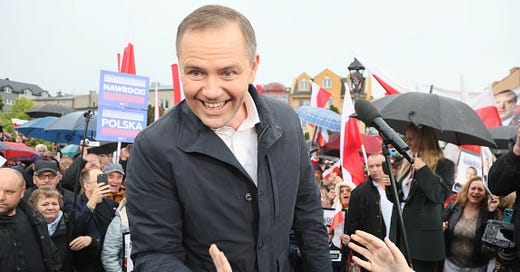Polish presidential candidate linked to organised hooligan fight in 2009
Media reports say Karol Nawrocki took part in a violent 2009 football brawl while working for the IPN. His campaign has confirmed the incident and dismissed criticism as political attacks.
Karol Nawrocki, the conservative Law and Justice-backed candidate in Poland’s presidential election, took part in an organised large-scale hooligan fight in 2009 while working at the Institute of National Remembrance, according to media reports.
The brawl involved around 140 participants from rival football clubs and included individuals later convicted of criminal offences.
The reports, published by Wirtualna Polska and Onet, have triggered a political row in the final days of the campaign. Nawrocki has not denied his involvement, instead describing the fight as a form of “noble, masculine combat.”
His campaign team confirmed the incident and stated that Nawrocki does not regret the episode. The prime minister and members of the Civic Coalition have criticised the candidate's past, while Nawrocki’s supporters have accused his opponents of personal attacks.
70 against 70
The incident took place on 25 October 2009 near the town of Rębiechowo, outside Gdańsk in northern Poland, following a top-flight football match between Lechia Gdańsk and Lech Poznań. According to reports, two organised groups of football hooligans, each numbering 70 individuals, met in a prearranged fight known in Poland as an "ustawka".
The confrontation lasted approximately six and a half minutes. Eyewitness accounts and fan websites describe a coordinated, large-scale brawl that ended in victory for the Lechia Gdańsk faction. Among those participating on the Lechia side was Karol Nawrocki, who at the time was a junior employee at the Institute of National Remembrance (IPN).
He is reported to have fought alongside members of “Chuligani Wolnego Miasta,” a well-known hooligan group with connections to the criminal underworld in the Gdańsk area.
Hooligans on both sides of the clash included individuals who were later convicted of serious offences. Members of the Lech Poznań side were associated with the “Young Freaks” group, some of whom were later sentenced for involvement in drug trafficking and other crimes.
On the Lechia side, several individuals who reportedly took part in the 2009 fight were later charged with serious crimes. Among them was Olgierd L. (surname withheld under Polish privacy law), who has since been arrested on charges including incitement to arson, illegal arms trafficking, and orchestrating violent assaults.
Another prominent figure linked to the group is Daniel U. (surname withheld under Polish privacy law), known by the alias “Dzidek,” a former boxer regarded as a key figure within the Gdańsk hooligan scene. In 2023, he was sentenced to 15 years in prison for the machete killing of a teenager in Kraków, and had previously been involved in violent attacks against rival groups.
Nawrocki: “noble, masculine combat”
News of Nawrocki’s involvement first surfaced during a live YouTube interview between Nawrocki and third-place presidential candidate and leader of the Sławomir Mentzen on Thursday.
During the conversation, Mentzen asked Nawrocki about his involvement in the hooligan fight. Nawrocki did not deny taking part. Instead, he described the episode as part of “forms of noble, masculine combat.”
Nawrocki linked his involvement in such fights to his long-standing interest in boxing. He described himself as a former heavyweight boxing champion and spoke about his years of training with the Stoczniowiec Gdańsk club. “To this day, I can still smell the gym where I trained,” he said during the interview.
Campaign team acknowledges the fight
Members of Karol Nawrocki’s campaign addressed the revelations during a press conference on Friday. Campaign boss Paweł Szefernaker confirmed that Nawrocki had taken part in what he described as a “youthful episode” and stated that the candidate “does not feel ashamed” of the incident.
What the law says
Legal experts cited by Wirtualna Polska note that under Polish law, taking part in an organised fight such as the 2009 incident may be punishable by up to five years in prison with a five-year statute of limitations.
The group linked to Karol Nawrocki – Chuligani Wolnego Miasta – has been described in Polish media as a structured hooligan organisation. Members have faced charges including assault, weapons offences, and drug trafficking.
In 2011, then-Central Bureau of Investigation official Zbigniew Maj referred to the organisers of the 2009 fight as “a typical organised criminal group.” In an interview with Gazeta Policyjna, he described their hierarchy, internal communications, and capacity to mobilze quickly as similar to other criminal networks in Poland.
Political reactions
The reports drew immediate political responses. Prime Minister Donald Tusk, speaking on TVN24, described the situation as unprecedented. “For the first time in Polish history, we have a presidential candidate who cannot hide his direct links to the criminal underworld,” Tusk said.
In response, senior Law and Justice figures rejected the allegations and criticised the timing of the reports. PiS MP Przemysław Czarnek, a close political ally of Nawrocki, described the coverage as “mud, slander, and insult.” He accused Tusk and the Civic Coalition of launching a personal attack due to a lack of arguments.
Poland is at the heart of Europe. As the continent’s centre of gravity shifts, understanding Poland is key to understanding Europe itself.
PolandWatch is your guide. With in-depth analysis, insights, and clear explanations, I’ll help you make sense of the strategies, struggles, and trends shaping Poland today.
Subscribe today for regular coverage.





